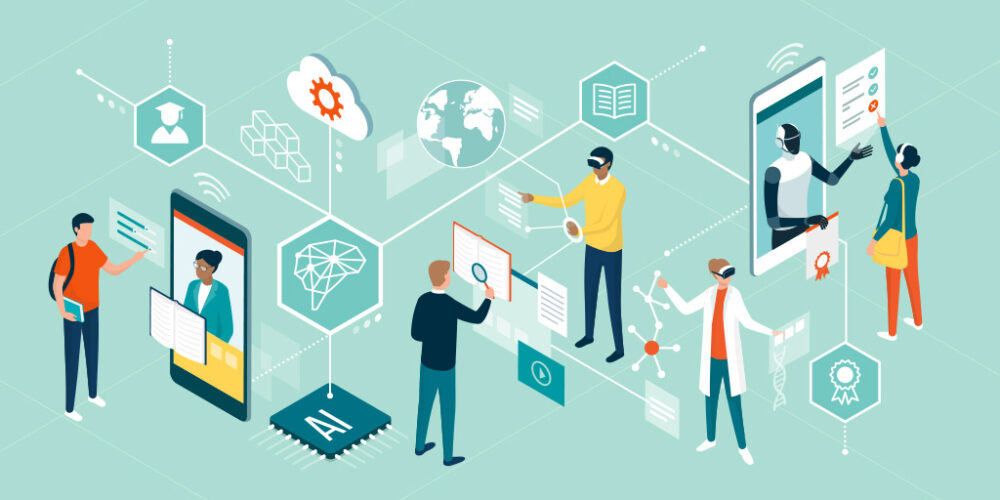
The AI Revolution took the world by storm this year, with ChatGPT becoming a household name in just a few months. It seems like there’s an AI for almost everything, from writing, to creating art, to coding, and even career planning. Now, AI career coaches can help you map and meet your professional goals from the comfort of your home.
An AI career coach is an online platform that provides personalized career advice, serving many of the same functions as a human coach with the added benefits of accessibility and affordability. Many AI career coaches hit the market these past few years, such as Jobiri, Bob, and AIMY.
But how good are AI coaches really? And should you entrust the course of your career to one of these chatbots?
In the advent of AI coaching, there are pros and cons to using these services for career guidance.
The pros of AI career coaching
The emergence of AI coaches quickly revolutionized the industry, increasing the accessibility, availability, and affordability of career coaching.
Before AI, you needed either in-person or remote access to a human career coach to receive services. This old model presented significant challenges for those in under-served communities with too few coaches, or those who didn’t have transportation to attend sessions. But with AI delivering coaching services right to a client’s home, access is expanding, empowering a greater number of people to take control of their careers.
AI chatbots are also available 24/7, unlike human career coaches. This means you can access quality career services on your own schedule, anywhere, at any time of the day or night. And you don’t have to pay more for this added convenience.
AI career coaches lower cost barriers, providing more affordable services than humans coaches. Traditional career coaching costs, on average, between $75-250 per hour, and people usually attend multiple sessions at that rate. For the unemployed and many others, the cost can be prohibitive, if not outright impossible.
Further, AI chatbots are thought to be more objective than humans, providing impartial, data-driven advice, unaffected by neither emotion nor opinion.
AI’s ability to analyze and apply data extends far beyond human’s capabilities. By processing data, AI can make personalized recommendations and actions plans based on your information, such as your work history, skills, personality traits, resume, and assessments.
So as an accessible, available, affordable, and analytical coach, AI beats out humans, providing valuable services to its users. But are these four things all you need in a career coach?
The cons of AI career coaching
Career coaching isn’t just about data. Like all coaching, career coaching is founded on a human relationship.
A human coach’s offerings extend far beyond the capabilities of AI. Human career coaches can forge a profound connection with their clients and provide them with empathic emotional support on their professional journeys.
By engaging with you in deep, dynamic conversation, a human career coach can help address internal issues, such as fears, insecurities, contradictions, and limiting thought patterns to help you reach your full potential.
Currently, AI is only capable of surface-level conversations, and is not yet able to simulate the complex, back-and-forth talk that engages clients in this deeper way. AI experts predict AI won’t achieve human-level listening, comprehending, and questioning abilities for another 10 to 15 years.
Unlike humans, AI career coaches are incapable of understanding the ethical considerations of a scenario. So, for example, if your actions or goals harm someone, AI would not detect this or advise against it.
And while people will say over and over again that AI is opinion-free and objective, AI can be biased. Remember, AI is created and taught by humans. If it is exposed to discriminatory content, it will replicate those teachings.
The world has yet to learn exactly how AI will impact the career coaching industry in the years ahead. But, for now, you can receive reliable, personalized career advice at the touch of a button with a variety of affordable AI career coaches. But for a more human experience, human career coaches remain the only way to receive engaging, empathetic career counseling.
When deciding whether to work with an AI or human career coach, consider your personal needs, goals, and preferences to determine which option will work best for you.
This article was written by Danielle Murphy.
Danielle Murphy is a content writer and copywriter with a passion for helping businesses meet their marketing goals with writing. When she’s not working (or writing for fun), she’s hiking or hobby farming around her home in New Hampshire.
